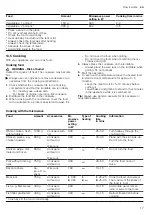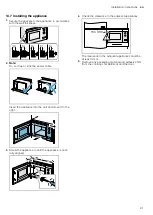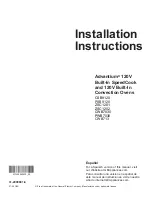
Installation instructions
en
19
13.6 Test dishes
These overviews have been produced for test institutes to facilitate appliance testing in accordance with EN
60350-1:2013 or IEC 60350-1:2011 and EN 60705:2012, IEC 60705:2010.
Cooking with the microwave
Food
Microwave power
setting in W
Cooking time in mins Note:
Custard, 750 g
1.
360
2.
90
1.
12–17
2.
20–25
Place the Pyrex dish 20 x 25 cm
on the turntable.
Biscuit
600
8–10
Place a 22 cm diameter Pyrex
dish on the turntable.
Meat loaf
600
20–25
Place a Pyrex dish on the
turntable.
Defrosting with the microwave
Recommended settings for using the microwave to defrost food.
Food
Microwave power
setting in W
Cooking time in mins Note:
Meat
1.
180
2.
90
1.
5–7
2.
10–15
Place the Pyrex dish (22 cm dia-
meter) on the turntable.
Cooking in combination with a microwave
Food
Microwave
power setting
in W
Type of heating Cooking time
in mins
Note:
Potato gratin
360
35–40
Place a 22 cm diameter Pyrex
dish on the turntable.
14 Installation instructions
Observe this information when installing the appliance.
14.1 Safe installation
Follow these safety instructions when in-
stalling the appliance.
¡
The appliance can only be used safely if it
is correctly installed according to the safety
instructions. The installer is responsible for
ensuring that the appliance works perfectly
at its installation location.
¡
Check the appliance for damage after un-
packing it. Do not connect the appliance if
it has been damaged in transit.
¡
Before starting up the appliance, remove
any packaging material and adhesive film
from the cooking compartment and the
door.
¡
Never remove the transparent film on the
inside of the door.
¡
Proceed in accordance with the installation
sheets for installing accessories.
¡
Fitted units must be temperature-resistant
up to 90 °C, and adjacent unit fronts up to
65 °C.
¡
Do not install the appliance behind a decor-
ative door or the door of a kitchen unit.
There is a risk of overheating.
¡
Cut-out work on the units should be carried
out before installing the appliance. Remove
any shavings. Otherwise, the correct opera-
tion of electrical components may be ad-
versely affected.






































